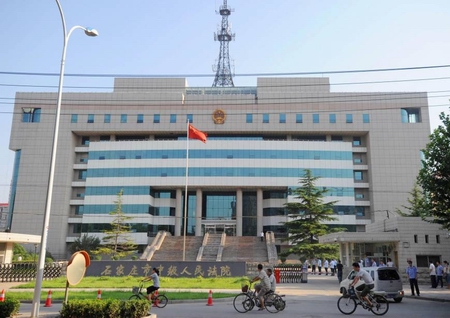
A man stood trial on Tuesday accused of poisoning frozen dumplings, including some that were exported to Japan, which made 13 people ill in 2008.
Lyu Yueting, 39, appeared at Shijiazhuang Intermediate People's Court and prosecutors said he could be sentenced to 10 years in prison.
Lyu, a former worker at Tianyang Food Plant in Hebei province, confessed in court that he put insecticide in the dumplings five times because he wanted a pay raise and was not getting on well with his co-workers.
The dumplings were either exported to Japan, where they made nine people ill, including a 5-year-old, or sold in Chengde, Hebei, where they sickened four people, prosecutors said.
The incident, which took place in January 2008, sparked worldwide concern over food safety in China before the Beijing Olympics.
Tianyang was forced to shut down and recall all its products, causing direct losses of at least 5.5 million yuan ($897,000). More than 1,300 workers at the factory lost their jobs.
Prosecutors said Lyu's crime had serious consequences and he should face severe punishment.
But Lyu argued that his act was aimed at drawing the management's attention to his request for a pay raise, not to deliberately harm anyone.
Lyu had worked at Tianyang for 15 years by 2008, but was still classed as a temporary worker. He said his salary and other conditions differed a lot from those of permanent employees.
"I was paid only 100 yuan for a Spring Festival bonus in 2007, while other contracted workers received thousands of yuan. I thought that as I had worked for the company for so long, I deserved higher pay. I was hoping the management could pay attention to people like me," he said.
After poisoning the dumplings with methamidophos, a type of pesticide, Lyu said he wrote three anonymous letters to the company warning that the food had been contaminated, but the management took no action.
The poisoned dumplings led to Japanese consumers boycotting frozen food from China, which disappeared from stores.
Bilateral relations became strained as the two countries disagreed over the source of the poisoning during early stages of investigations.
Yang Bojiang, a Japanese studies expert at the Chinese Academy of Social Sciences, said the trial will help improve Sino-Japanese relations.
"The Japanese have paid great attention to the incident. Now they can see, through this transparent court hearing, that China has taken all measures to ensure food safety. It will be conducive to improving China's image in Japan," he said.
The trial lasted three hours. A verdict will be announced later.





